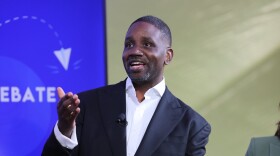Detroit residents will elect a new mayor on November 4. There are two candidates on the ballot: the Rev. Solomon Kinloch Jr. and current Detroit City Council President Mary Sheffield.
Sheffield spoke to Michigan Public's Morning Edition host Doug Tribou about her goals for the city, Detroit's role in the state of Michigan as a whole, and her work on the city council.
Doug Tribou: You were the youngest council member Detroit had ever elected when you took office in 2014. Then you became the youngest city council president in Detroit history in 2022. If you are elected mayor, what are your top three priorities?
MS: I would say number one definitely has to be neighborhood development. Bringing amenities back into our commercial corridors, whether it's, you know, grocery stores, coffee shops, restaurants. But we also have to ensure that we're addressing neighborhood infrastructure. So that's improving our sidewalks, ensuring that our residents have access to beautification grants and home-repair grants to fix the existing infrastructure within our city as well.
And then secondly, I would say housing. We've invested $1 billion to date in the creation and preservation of affordable housing. I would love to see the city focus more on paths to homeownership, building more single-family housing in Detroit, and ensuring that every family has the ability to access safe, quality, affordable housing. And also ensuring that we're preventing homelessness.
And then lastly, I will say, you know, really just building our middle class. We still have a relatively high level of poverty in Detroit. And so we are going to be focusing on increasing the quality of life of our city because I believe that Detroit is a world-class city and a destination of opportunity. And we want to retain those that are here, but we also want to attract and to continue to grow our population right here in our city.
"We want to retain those that are here, but we also want to attract and to continue to grow our population."Detroit mayoral candidate Mary Sheffield
DT: I want to follow up on the neighborhood development, which I think ties in with some of the middle-class issues that you were talking about there as well. When you say you want to see more amenities and more businesses come into the neighborhoods, what can the city do that hasn't already been done to increase that type of growth beyond the downtown area?
MS: A couple of things. One, we are in the process now of really making it easier for businesses to open up in Detroit. What we've realized is there are a lot of antiquated zoning and ordinances that are on the books, so we're trying to figure out ways that we can reduce requirements, transform some of our zoning and permitting and licensing. It makes it a lot easier. It fast tracks the process, and we can get grocery stores and restaurants and coffee shops to open up easily within our neighborhoods.
Secondly, we have tools like the Corridor Improvement Authority that allows you to capture taxes within a corridor that can be reinvested back into that area for development. And these are underutilized tools that can help accelerate the development of our commercial corridors.
DT: You mentioned affordable housing, which is a concern in Detroit and across Michigan, and across the country, of course. And one of the issues in Detroit is that the process of blight removal has also created a lot of vacant lots there. You mentioned that you'd like to see more construction of single-family housing. Do you see a way that Detroit can promote that, but also control the cost there, so that those new homes remain affordable?
MS: We're actually looking at best practices from other cities. The city of Philadelphia has done a great job at just what you mentioned, and they have a turnkey initiative program where they essentially are turning over vacant land that is the city's owned land in return for low-income or affordable development.
And so I think there's ways that we can offer incentives. For example, we have a program called the PILOT program that we just approved, and essentially we are reducing property taxes based on the amount that you will reduce your rent. We also have a down-payment assistance program that we created with Huntington Bank and [its CEO] Gary Torgow, expanding that program so that we can get more first-time home buyers as well.
But any ways that we can provide gap funding for developers who can ensure that they're building housing for those who are middle income and for affordable pathways, we will continue to explore.
"What we've realized is, there are a lot of antiquated zoning and ordinances that are on the books."Detroit mayoral candidate Mary Sheffield on trying to attract more small businesses to the city's neighborhoods
DT: You've been on the city council for current Mayor Mike Duggan's entire tenure, the three terms, so you've worked with him closely. You've listed a lot of accomplishments here and a lot of things that are in progress already. Where would you say the mayor has fallen short with his administration? And have there been times when you've been at odds with him on policy?
MS: It's publicly recorded. We definitely have had our disagreements over the years. The mayor oftentimes talks about the Pistons deal. And it was through some very tough negotiations we created the city's first ever neighborhood-improvement fund that now captures the taxes of the players in the arena, and it goes into a fund that has been used to develop numerous vacant lots throughout our neighborhoods. And so, our disagreements have been used to produce very, very strong policies and better benefits for our residents.
DT: Are you talking about the agreement to bring the Pistons to Little Caesars Arena? Or are you talking about the original LCA agreement?
MS: The Pistons coming to the LCA arena. Yes.
As it relates to [Duggan's] shortfalls, you know, I am not the one to really pick at what he did and didn't do. But what I think is very obvious — anyone you talk to in Detroit — we know that there has to be a neighborhood focus. And my goal is to ensure that I'm building on the foundation that has been laid.
DT: Safety is a common concern for many Detroiters. How would you assess the state of safety in policing in the city right now, and what would you do to make improvements?
MS: The last 12 years that I've been on the city council, crime has gone down. And just this year, there was an announcement that in all categories of violent crime, there has been a significant reduction just compared to last year. But I have always indicated one life lost is still far too many, and we still have a lot to do to ensure that the perception of crime is changed in Detroit and that people actually feel safe in their neighborhoods.
And so we're going to continue to invest in our community violence intervention work and ensure also that we're supporting, with technology and resources, our Detroit Police Department. I would love to see more community policing — boots on the ground — in our neighborhoods in a way that's not over-policing, but is building trust within our communities and also ensuring that we're expanding and building out our Mental Health Co-response Unit, as well, within DPD.
"Whatever happens in Detroit impacts this entire region."Detroit City Council President Mary Sheffield
DT: Before I let you go, I'd like to ask you about Detroit's relationship to the state as a whole. The city is the biggest city in the state of Michigan, but as you well know, there's been push-pull over the years, particularly at the state Legislature level, about how much funding is being allocated to help Detroit in various ways.
There's also been a lot of tension around regional transit votes and whether those [proposals] are benefiting the suburbs as much as they're benefiting Detroit. Where do you see Detroit's relationship to the state as a whole? And how do you see the role of mayor in building those relationships?
MS: There is no doubt that Detroit's success is contingent upon having strong relationships and the ability to get things done in Lansing. I am afforded the opportunity and privilege now, serving 12 years, to have built a lot of those relationships, and will continue to do that as mayor. We were successful in a lot of ways in this last budget, receiving a significant amount of funding that will allow us to keep our community violence intervention work.
We got some additional funding around transit that was very beneficial to Detroit. And also, we know that whatever happens in Detroit impacts this entire region. And I'm very excited about continuing to build those relationships with the leadership in Lansing to ensure that Detroit is at the forefront moving forward.
Editor's note: Some quotes in this article have been lightly edited for length and clarity. You can hear the full interview near the top of this page.









